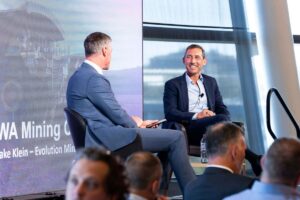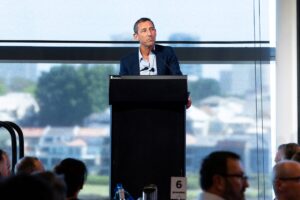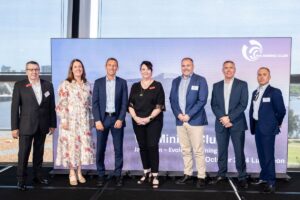Energy evolution requires Australia to face inconvenient truths

Evolution Mining (ASX: EVN) executive chairman Jake Klein spoke on the challenges Australia must face to meet the demands of the energy transition and make the most of its resources boon at the WA Mining Club October luncheon.
The state of play for Australia is rapidly changing, driven not only by the energy transition, but also by the realisation of Australia’s wealth of key resources and transforming trade connections with China.
Mr Klein says a lot has changed since he first got into mining.
“When I first started working in the mining industry 30 years ago, and China emerged as Australia’s largest customer, the iron ore price was around $25 per tonne and we were selling roughly 120mtpa,” he said.
“Today the iron ore price is around [$151] US$100 per tonne, and we sell close to 1btpa.
“In revenue terms, that is a phenomenal 33x higher, providing enormous flow on benefits to all stakeholders including the state of WA and the Federal Government.
“Likewise, our third largest mineral export, and one which I’m especially interested in, gold, has increased from $380poz to today’s price of $4,000poz, which is about seven times higher.
“The reality is… mining has made all Australians prosperous, not just miners and the communities around them.”

Ernest Henry and Mt Rawdon in Queensland, Mungari in WA, and Red Lake in Ontario, Canada — and
an 80% share of Northparkes in NSW.
The impact of the mining industry on everyone’s wallets can’t be understated.
The latest ATO Corporate Tax Transparency Report shows that Australia’s mining industry continues to be the nation’s biggest taxpayer, paying $43.1b in company tax for FY23.
This record tax contribution marks the second consecutive year the sector has paid more in tax than all other industries combined.
In addition to this hefty contribution, mining continues to pay the highest average wages and plays a vital role in supporting communities across Australia backing 1.1 million jobs in the mining sector and its supply chains, according to the Minerals Council of Australia.
But as the country benefits from mining, we also become increasingly reliant on the industry to secure our daily lives. As mining is forced to find its footing in changing operational and social landscapes, Australia must also face some hard truths.
“As we all know, from completing an induction before entering an underground mine, stench gas will be released in the case of emergency, so I’m afraid I’m here today to discharge the stench gas,” said Mr Klein.
“We are at a crossroads where inaction is going to cost us. “As Al Gore, former U.S. Vice President, said in his award-winning documentary An Inconvenient Truth, future generations may well have occasion to ask themselves ‘what were our parents thinking? Why didn’t they wake up when they had a chance?’
“Today, I’d like to highlight three inconvenient truths Australia faces which may well have future generations asking this question of us.
“We have the chance to course correct, but I believe time is running out.”
Inconvenient truth #1: globalisation is over, and the world is decoupled

As Australia’s largest trading partner, China buys almost a third of all Australian exports, with resources and energy making up the largest share. Australia’s iron ore, natural gas and gold exports lead the way, supporting the rise of China’s middle class. But with China’s exponential development, its once steady relationship with Australia transforms as well.
Mr Klein says China has not integrated into the western democratic world.
“We are now effectively in long-term strategic competition with China, a country that has been the biggest driver of our economic prosperity over the last 30 years,” he said.
“Globalisation is essentially over, and China is very close to be becoming the world’s largest economy.”
Mr Klein says China has built some of the most formidable and successful resources companies in the world, driven by strong government supports and access to cheap capital, allowing China to dominate battery manufacturing and outperform Australia in copper and nickel.
“Nickel production is another area where we have been completely outmanoeuvred and outplayed,” he said.
“Cheap power and cheap labour in Indonesia coupled with Chinese processing technology and investment has decimated our domestic nickel industry.
“I really believe that the key difference is that China has been able to think and act strategically and unless we can shift from tactical short-term decision making, I’m afraid we will consistently be on the losing side.”
Turning the tide will require Australia to recognise the significant cost of building our own minerals supply chains that will enable us to produce our strategic and critical materials without Chinese processing and manufacturing.
Inconvenient truth #2: our resources won’t last forever

McDonnell, Evolution Mining’s Jake Klein, WA Mining Club’s Dani Tamati, Locton’s Stephen Kerridge,
WSP Calibre’s Adrian Chapman and Cell Media’s Damien Clarke.
The cost of developing a mature, domestic supply chain leads directly into Mr Klein’s second inconvenient truth.
Mr Klein says the reality is our resources won’t last forever, and it is becoming increasingly expensive to discover, mine and process minerals in Australia, with this price tag only set to increase over the coming decades.
“It is therefore imperative that we lay the groundwork today to ensure that we stay ahead of the pack and remain globally competitive and innovative,” he said.
“I’ve often made the point that Australia is God’s gift to miners: a vast, underpopulated, geologically prospective country that is a great place to mine, but we have the opportunity and in fact, I would argue, the obligation to make it even greater.”
Mr Klein says one way to do this is by ensuring legislative processes empower mining.
“The recent Federal Government decision to effectively overturn the NSW Government’s decision to approve the development of Regis’ McPhillamys mine is a great example of what we should not be doing,” he said.
“New South Wales has one of the most rigorous and thorough approvals processes in the world this project went through years of extensive scrutiny including public consultation by the
Independent Planning Commission before its approval by the NSW Government.
“We cannot have a repeat of this and there needs to be a change in the legislative process that ensures that any red flags at a state or Federal level that risk a projects approval are identified and dealt with early.
“To have them emerge at the end of a process after millions of dollars has been invested is unacceptable and unnecessarily tarnishes the attractiveness of Australia as a mining destination.
“Yes, we have abundant resources and are world-class miners, but we also have the potential to extend this and become the world epicentre of excellence for value adding these products.
“Why are we okay to do only the mining while we send these scarce and valuable materials offshore to be processed?
“To me, this represents considerable value leakage for Australia.” This sentiment is increasingly relevant to the big players in the Australian mining industry, as Regis Resources (ASX: RRL) has recently commenced formal legal proceedings in the Federal Court in respect to the Section 10 decision over McPhillamys.
Inconvenient truth #3: if we want net zero by 2050, someone must pay
There is a lot of ground to be covered for Australia to reach its net zero targets. This push to net zero will require extensive investment into research and development, implementation of green technology and economic empowerment.
Mr Klein says rather than being intimidated by the price tag, we need to have a mature conversation about who will invest the tens of billions of dollars required to reach net zero by 2050.
“We should all agree and be transparent about who and how it is going to be paid,” he said.
“The cost of getting this wrong is just too significant.
“In a recent paper published by the McKenzie Global Institute, they state that under any energy transition scenario, it requires a power system in 2050 that has about five times more gigawatts installed than today’s power system.”
The McKenzie Global The Hard Stuff report also notes the energy transition is in its early stages, as deployment of low emissions technologies is only at about 10% of the levels required by 2050 in most areas, and that has been in comparatively easy use cases.
Mr Klein says delivery of the required green power is a nation building project and should be treated as such.
Evolution is an example of the opportunity that can bloom from proper investment in overcoming this gap.
“Evolution holds an important component of the solution for Queensland,” Mr Klein said.
“We have spent around $25m completing a feasibility study to assess the conversion of our Mt Rawdon operation into a $7b [or more] pumped hydro energy storage project.
“The project has a life of 80 years and the potential to generate up to 20GWh every single day, which is enough to power some two million homes.
“The feasibility study is now complete and unequivocally demonstrates that Mt Rawdon is the most advanced and cost efficient pump hydro project in Australia.”
But who pays for these projects? Mr Klein says there are really only two options.
“Either the government owns or lends money to a project like this and finds the money on its balance sheet today, or it guarantees offtake at a higher future power price,” he said.
“A green grid is a nation building project and will be expensive, but like national endeavours of this nature that our country has tackled before, it needs a Federal Government strategic plan that is endorsed and agreed by the states as to how it will be collectively funded and implemented, not just long dated targets.”






















